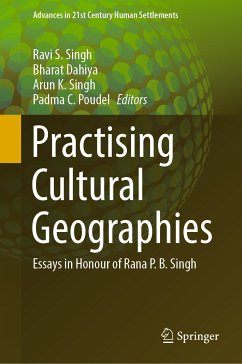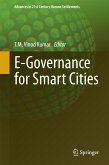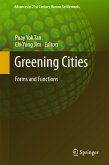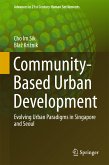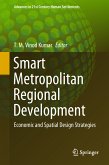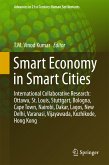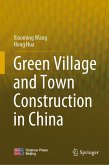Practising Cultural Geographies (eBook, PDF)
Essays in Honour of Rana P. B. Singh
Redaktion: Singh, Ravi S.; Poudel, Padma C.; Singh, Arun K.; Dahiya, Bharat
113,95 €
113,95 €
inkl. MwSt.
Sofort per Download lieferbar

57 °P sammeln
113,95 €
Als Download kaufen

113,95 €
inkl. MwSt.
Sofort per Download lieferbar

57 °P sammeln
Jetzt verschenken
Alle Infos zum eBook verschenken
113,95 €
inkl. MwSt.
Sofort per Download lieferbar
Alle Infos zum eBook verschenken

57 °P sammeln
Practising Cultural Geographies (eBook, PDF)
Essays in Honour of Rana P. B. Singh
Redaktion: Singh, Ravi S.; Poudel, Padma C.; Singh, Arun K.; Dahiya, Bharat
- Format: PDF
- Merkliste
- Auf die Merkliste
- Bewerten Bewerten
- Teilen
- Produkt teilen
- Produkterinnerung
- Produkterinnerung

Bitte loggen Sie sich zunächst in Ihr Kundenkonto ein oder registrieren Sie sich bei
bücher.de, um das eBook-Abo tolino select nutzen zu können.
Hier können Sie sich einloggen
Hier können Sie sich einloggen
Sie sind bereits eingeloggt. Klicken Sie auf 2. tolino select Abo, um fortzufahren.

Bitte loggen Sie sich zunächst in Ihr Kundenkonto ein oder registrieren Sie sich bei bücher.de, um das eBook-Abo tolino select nutzen zu können.
This festschrift honours Prof. Rana P.B. Singh who has dedicated his life to teaching and conducting research on cultural geography with a 'dweller Indian perspective'. The book focuses on the cultural geographies of India, and to an extent that of South Asia. It is a rich collection of 23 essays on the themes apprised by him, covering landscapes, religion, heritage, pilgrimage and tourism, and human settlements.
- Geräte: PC
- ohne Kopierschutz
- eBook Hilfe
- Größe: 17.72MB
Andere Kunden interessierten sich auch für
![Henri Lefebvre (eBook, PDF) Henri Lefebvre (eBook, PDF)]() Andrew MerrifieldHenri Lefebvre (eBook, PDF)51,95 €
Andrew MerrifieldHenri Lefebvre (eBook, PDF)51,95 €![E-Governance for Smart Cities (eBook, PDF) E-Governance for Smart Cities (eBook, PDF)]() E-Governance for Smart Cities (eBook, PDF)73,95 €
E-Governance for Smart Cities (eBook, PDF)73,95 €![Greening Cities (eBook, PDF) Greening Cities (eBook, PDF)]() Greening Cities (eBook, PDF)89,95 €
Greening Cities (eBook, PDF)89,95 €![Community-Based Urban Development (eBook, PDF) Community-Based Urban Development (eBook, PDF)]() Im Sik ChoCommunity-Based Urban Development (eBook, PDF)73,95 €
Im Sik ChoCommunity-Based Urban Development (eBook, PDF)73,95 €![Smart Metropolitan Regional Development (eBook, PDF) Smart Metropolitan Regional Development (eBook, PDF)]() Smart Metropolitan Regional Development (eBook, PDF)161,95 €
Smart Metropolitan Regional Development (eBook, PDF)161,95 €![Smart Economy in Smart Cities (eBook, PDF) Smart Economy in Smart Cities (eBook, PDF)]() Smart Economy in Smart Cities (eBook, PDF)169,95 €
Smart Economy in Smart Cities (eBook, PDF)169,95 €![Green Village and Town Construction in China (eBook, PDF) Green Village and Town Construction in China (eBook, PDF)]() Xiaoming WangGreen Village and Town Construction in China (eBook, PDF)121,95 €
Xiaoming WangGreen Village and Town Construction in China (eBook, PDF)121,95 €-
-
-
This festschrift honours Prof. Rana P.B. Singh who has dedicated his life to teaching and conducting research on cultural geography with a 'dweller Indian perspective'. The book focuses on the cultural geographies of India, and to an extent that of South Asia. It is a rich collection of 23 essays on the themes apprised by him, covering landscapes, religion, heritage, pilgrimage and tourism, and human settlements.
Dieser Download kann aus rechtlichen Gründen nur mit Rechnungsadresse in A, B, BG, CY, CZ, D, DK, EW, E, FIN, F, GR, HR, H, IRL, I, LT, L, LR, M, NL, PL, P, R, S, SLO, SK ausgeliefert werden.
Produktdetails
- Produktdetails
- Verlag: Springer Nature Singapore
- Seitenzahl: 580
- Erscheinungstermin: 20. Mai 2022
- Englisch
- ISBN-13: 9789811664151
- Artikelnr.: 64082592
- Verlag: Springer Nature Singapore
- Seitenzahl: 580
- Erscheinungstermin: 20. Mai 2022
- Englisch
- ISBN-13: 9789811664151
- Artikelnr.: 64082592
- Herstellerkennzeichnung Die Herstellerinformationen sind derzeit nicht verfügbar.
(late) Ravi S. Singh (1971-2021) had earned PhD from Jai Prakash University at Chhapra (2000), and DLitt (2020) from the Banaras Hindu University (BHU) - the first and the only one in BHU history of 75 years. His employment career started in 1996 as a Lecturer in Geography at Rang-Frah College at Changlang, Arunachal Pradesh, followed by a lectureship in Kisan P.G. College Bahraich, Uttar Pradesh in 2001. Ravi had returned to his alma mater and joined as a Reader (Associate Professor) in the Department of Geography, BHU, on 29 October 2005 and was promoted to full Professor on 29 October 2011, and served there till his last breath on 21 April 2021. Of course, he was a trained social and cultural geographer, and had developed critical insights into several branches in geography and interdisciplinary discourses, which included Geographical Thought, Social and Cultural Geography, Geography Education, Peri-urban Geographies, and Qualitative Research Methods-all illustrated with his innovative research publications. Eight students earned their PhD degrees under his supervision (2013-2019). In a short span of only 25 years of his profound career, he had to his credit publishing two monographs, five edited books, and hundred research papers. Associated with many academic bodies of repute, he had been the Vice-President: Indian Society of Spatial Science, and the Secretary: The Indian Institute of Geographers. Bharat Dahiya is a Director of Research Center for Sustainable Development and Innovation at the School of Global Studies, Thammasat University, Bangkok, Thailand. He is an Extraordinary Professor at the School of Public Leadership, Stellenbosch University, Stellenbosch, Western Cape, South Africa, and a Distinguished Professor at Urban Youth Academy, Seoul, Republic of Korea. He is also a Founding Board Member of the World Smart Cities Economic Development Commission--under the World Business AngelsInvestment Forum, based in Miami, USA. Trained as a Geographer and Urban-Regional Planner, he holds a PhD from the University of Cambridge, UK. Since early-1990s, he has worked on the international practice, policy analysis and applied research on sustainable urbanisation, including city planning and development strategies, sustainable human settlements development, upgrading strategies, urban poverty, urban environment and resilience, cultural heritage and landscapes, community-led development, and urban governance. Working with international development banks and United Nations agencies, such as the World Bank, and UN-Habitat, he initiated, led, managed and/or contributed to policy advice, technical assistance, and operational projects on sustainable development in a number of countries in around the world. Whilst at the World Bank, Bharat co-authored a book, Urban Environment and Infrastructure: Toward Livable Cities (2004). At UN-Habitat, he conceptualised and coordinated United Nations' first-ever report on The State of Asian Cities 2010/11 (2010; published in Chinese language in 2014). More recently, he co-authored Partnering for Sustainable Development: Guidelines for Multi-stakeholder Partnerships to Implement the 2030 Agenda in Asia and the Pacific (UNU-IAS, and UN-ESCAP, 2018), and co-edited New Urban Agenda for Asia-Pacific: Governance for Sustainable and Inclusive Cities (Springer, 2020). Bharat has held academic positions in Australia, Indonesia, South Africa, and Thailand. In December 2021, the Global Council for the Promotion of International Trade conferred a Global Sustainability Award 2021 on Prof. Dahiya. Arun K. Singh obtained his PhD from Indore. He joined Higher Education Department of Madhya Pradesh in September 1993 as Assistant Professor of Geography and served as teaching faculty (2002-2007) in Madhya Pradesh Academy of Administration and Management, Bhopal, joined BHU as AssociateProfessor in June 2007. Since June 2010, he is Professor of Geography and Coordinator of the proposed postgraduate course on Urban and Regional Studies under the IoE scheme. He has published three edited books and more than 50 research papers in national/international journals and chapters in edited books. His area of interest includes Urban Studies, Population Geography, Participatory Planning and Governance. He was editor of a journal Governance published by HUDCO Chair, Academy of Administration and Management, Bhopal. He has completed three projects sponsored by the HUDCO-HSMI, UNDP and DfID in Academy of Administration, Bhopal and one major research project on water supply and sanitation funded by University Grants Commission, New Delhi. Padma Chandra Poudel is an Emeritus Professor of Geography of Tribhuvan University (TU), Nepal with PhD from Banaras Hindu University, India. His field of interest and specialization are tourism, environment, and planning. He worked at different international and national organizations in different capacities and is credited as Service Commission Member of Pokhara University; Head of Central Department of Geography, TU; Member of PhD Research Committee of Faculty of Humanities and Social Sciences, TU; Senate member of TU; Chairman of urban area determination commission of Nepal Government; Senior advisor of International Labour Organization (ILO); Advisor of Nepal Tourism Board. Prof. Poudel also served as General Secretary of Nepal Geographical Society for nearly two decades. Presently, he is Chairman of Geography Subject at Curriculum Development Centre of the Ministry of Education and Culture, Government of Nepal. He has published dozens of research articles in reputed international and national journals.
Introduction: Essays in Honour of Rana P.B. Singh.- Rana Pratap Bahadur Singh, 'Rana-ji': Academic Contributions, Professional Career and Recognition.- Making of a Dweller Indian Cultural Geographer: In Conversation with Professor Rana P.B. Singh.- Theoretical Perspectives on Landscape Perception.- Sacredscapes vis-à-vis Faithscapes: Cultural Landscapes of Ayodhya, a Holy-Heritage City of India.- Char Landscapes of the Brahmaputra Riverine Tract, Assam: Elements of Evolution and Cultural Ecology .- Re-connecting Communities with Public Spaces: A Proposal for Rejuvenation of Sacred kunds in the Historic city of Varanasi.- The Priesthood of the Temple of Vi hoba in Pandharpur, Maharashtra .- Geographical Spread of Hindu Religion and Culture into the West.- Geographical Patterns of Indigenous Religious Belief Systems in North-East India: A Case Study .-Kautilya's Political Geography - Concepts and Ideas: An Example of Ancient Indian Geographical Thinking.- Genealogy and Its Role in Matrimony: A Study of Panji System of Mithila Region, Bihar (India).- The Two Faces of Bodhgaya.- Local Knowledge Education on School Students and Vernacular Landscape Identity Promoting: a case of Dongshan Town, Suzhou, China.- The Misings of Assam in the Midst of Tradition and Modernity: A Comparative Study of Selected Rural and Urban Areas.- Lumbini, Nepal: The Birthplace of Buddha and the Powerful Place of Pilgrimage in the World.- Pañcakroshi Yatra: Symbolic Manifestation of the Spatial to the Spiritual.- Cultural Tourism based Regional Development in Rajasthan, India.- Baul-Sufi Interface and Cultural Tourism: A Study in Northern Rarh of West Bengal, India.- Cultural Images of Kolkata: A Contemporary Perspective.- Situating Animals in the Aesthetics of a Global City: Stray Cattle and Dairy Farmers in Delhi, India.- Urban Sanitation in Indian Cities: Reflections from Varanasi.- Perspective on Agricultural Land Use Trajectory in the Peri-Urban Interface of a Developing Economy: A Case ofAligarh City.
Introduction: Essays in Honour of Rana P.B. Singh.- Rana Pratap Bahadur Singh, 'Rana-ji': Academic Contributions, Professional Career and Recognition.- Making of a Dweller Indian Cultural Geographer: In Conversation with Professor Rana P.B. Singh.- Theoretical Perspectives on Landscape Perception.- Sacredscapes vis-à-vis Faithscapes: Cultural Landscapes of Ayodhya, a Holy-Heritage City of India.- Char Landscapes of the Brahmaputra Riverine Tract, Assam: Elements of Evolution and Cultural Ecology .- Re-connecting Communities with Public Spaces: A Proposal for Rejuvenation of Sacred kunds in the Historic city of Varanasi.- The Priesthood of the Temple of Vi hoba in Pandharpur, Maharashtra .- Geographical Spread of Hindu Religion and Culture into the West.- Geographical Patterns of Indigenous Religious Belief Systems in North-East India: A Case Study .-Kautilya's Political Geography - Concepts and Ideas: An Example of Ancient Indian Geographical Thinking.- Genealogy and Its Role in Matrimony: A Study of Panji System of Mithila Region, Bihar (India).- The Two Faces of Bodhgaya.- Local Knowledge Education on School Students and Vernacular Landscape Identity Promoting: a case of Dongshan Town, Suzhou, China.- The Misings of Assam in the Midst of Tradition and Modernity: A Comparative Study of Selected Rural and Urban Areas.- Lumbini, Nepal: The Birthplace of Buddha and the Powerful Place of Pilgrimage in the World.- Pañcakroshi Yatra: Symbolic Manifestation of the Spatial to the Spiritual.- Cultural Tourism based Regional Development in Rajasthan, India.- Baul-Sufi Interface and Cultural Tourism: A Study in Northern Rarh of West Bengal, India.- Cultural Images of Kolkata: A Contemporary Perspective.- Situating Animals in the Aesthetics of a Global City: Stray Cattle and Dairy Farmers in Delhi, India.- Urban Sanitation in Indian Cities: Reflections from Varanasi.- Perspective on Agricultural Land Use Trajectory in the Peri-Urban Interface of a Developing Economy: A Case ofAligarh City.
